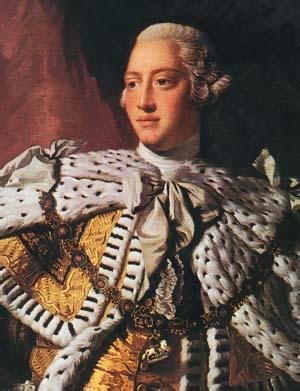
"Knavery seems to be so much the striking feature of its [America's] inhabitants that it may not in the end be an evil that they have become aliens to this kingdom."
When King George III of
England issued the Proclamation of 1763 at the end of the 'French
and Indian War," he was simply restating the principles long
established and widely accepted by European monarchs in
International law. In his statment, the king insisted the
only he had the right to enter into treaty negotiations with Indian
leaders in sovereign-to-sovereign relationships in which land was
purchased or exchanged. Further, he drew a line on the map
that followed the ridgeline of the Appalachian mountains and
declared that all land to the west of that line was owned by the
Indian nations.
To colonial land speculators like George
Washington and Benjamin Franklin, this claim of authority was an
unofficial declaration of war. Washington argued that the Mad
King had lost his mind, and Franklin went so far as to sail to
London in hopes of getting the king to change his mind, but that
was not to happen.
Click here for more on King George III
To the average citizen in the colonies,
the king's declaration changed nothing in day-to-day life.
Conversely, the subequent taxation acts - the Stamp Act - enflamed
the average colonists because it levyed a tax which they could ill
afford, but the aristocracy shrugged these off as being little more
than a passing nuisance. Reactions from the citizens,
however, made them realize that they could use this animosity to
their benefit in fomenting a revolutionary spirit for independence
from the king, and this is precisely what they did. In many
respects, once the king made his proclamation in 1763, it was only
a matter of time before his subjects in the colonies in the New
World revolted against his authority.
The irony of this comes decades later once
the new government is formed. Now, Benjamin Franklin and
George Washington are in control of their own destinies. One
of the first things they did was draft a clause in the
Constititution which made it illegal for anyone but the federal
government (excluding state governments) to engage in commerce with
Native Nations. In other words, the very authority they
rebelled against in King George III was now a central legal tenet
of the law of the land. George III's proclamation had come
full circles. The many ironies presented by this brief period
of history were not lost on the king, who noted:
Related People
Related Events
Related Flashpoints
Related Places